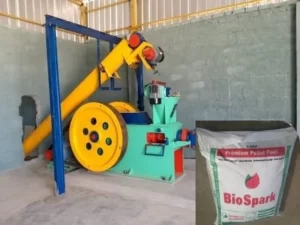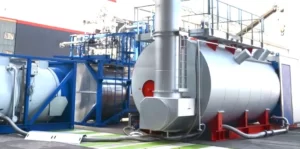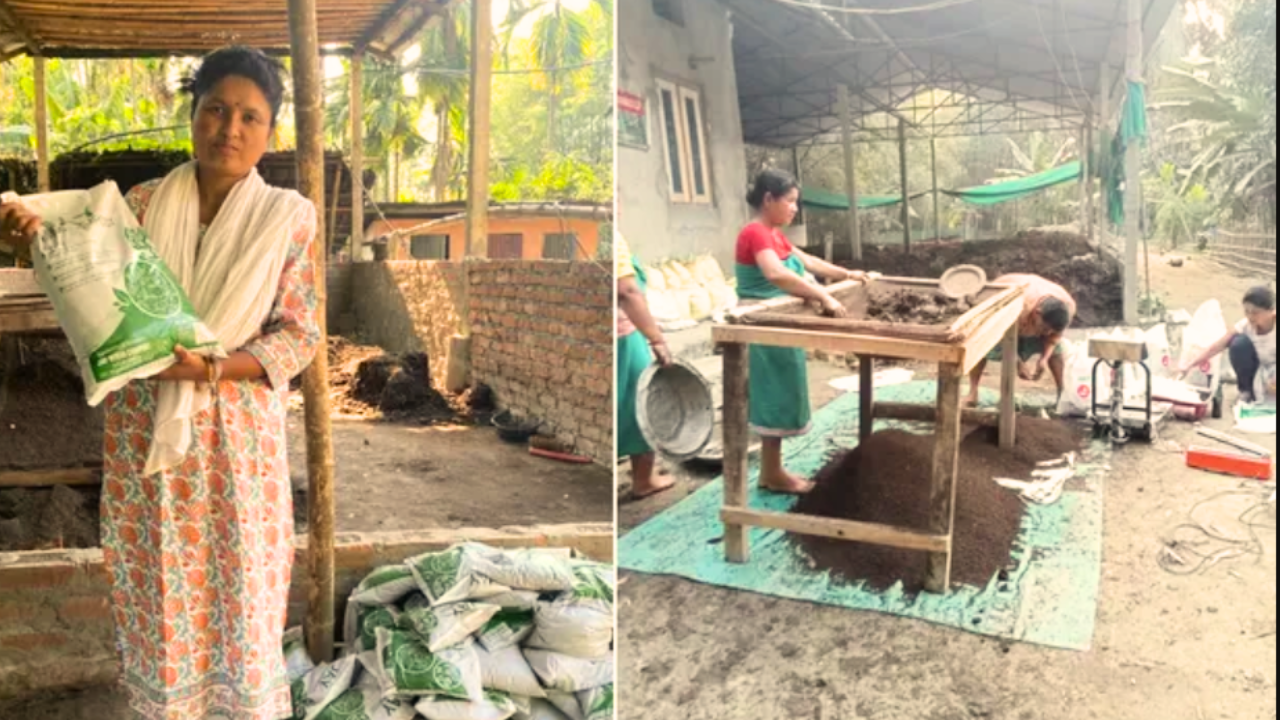After spending 17 years as an analyst in the stock market, Ashvin Patil decided he wanted to venture into something new. Instead of pursuing another job in equity research, he had a different vision. Hailing from a farming family in Maharashtra, Ashvin turned his attention to the agricultural sector, which, despite being the largest employer in the country, faced numerous challenges.
Ashvin shares, ‘For a whole year, we conducted market research and brainstormed various agricultural ideas. Then, around 2017, I started traveling across India to grasp the issues faced by farmers. One major concern was the leftover agricultural waste after harvesting, known as post-harvest residue.’
The most commonly grown cash crop in many states is cotton, and its stalks are often burned due to the lack of waste disposal options. Similarly, farmers frequently resort to burning post-harvest paddy stubble, leading to environmental pollution and health problems.
‘I believed that if we could transform this residue into a valuable product, it would benefit both farmers and the environment. One approach was to convert this agricultural waste into solid biofuels in the form of briquettes and pellets. These biofuels could be used by industries in their boiler plants to generate energy,’ Ashvin explains. In 2018, Ashvin, along with Chaitanya Korgaonkar, founded Biofuels Junction, aiming to provide a cleaner alternative to diesel and coal for industrial purposes.
Biofuels Junction sources agricultural waste from farmers and processes it into solid biofuels at the ne

arest manufacturing facility in its network. The company’s field team ensures the quality and consistency of these biofuels, which replace coal, diesel, and furnace oil in industrial plants.
Chaitanya and Ashvin have put in approximately Rs 7 crore from their personal savings, contributions from friends and family, into Biofuels Junction. This investment covered expenses for developing custom software and an in-house procurement platform. Ashvin mentions, ‘We recently secured funding from reputable international investors and an impact fund.’
The company has been turning a profit since the financial year 2019. Their revenue has grown tenfold from FY19 to FY23, reaching Rs 66.5 crore in the last fiscal year.
Solid biofuels are created by compacting agricultural and wood waste under high pressure, without the need for any binding agents. This compression increases the bulk density, making it easier to stack and transport pellets or briquettes. It also produces a more compact and consistent fuel source, leading to cleaner combustion. These biofuels are not flammable and can replace coal, diesel, or other traditional fuels in industrial boilers.
Biofuels – a pressing necessity
Using biofuels offers a solution to managing agricultural waste, curbing the release of greenhouse gases that result from conventional fuel use, and reducing our carbon footprint. Biofuels provide a clean and sustainable alternative to traditional energy sources.
In India, approximately 500 million tonnes of agricultural residue are generated each year, with nearly 200 million tonnes going to waste or being burned without any productive use. This represents a potential business worth around Rs 50,000 crore.
Despite the significant potential for converting biomass into fuels, Ashvin recognized that three key factors hindered the widespread production and adoption of biofuels: quality, consistency, and compliance.
Also Read: Ticket 9’s Journey to Success: Unveiling the Event Tech Empire and Unprecedented Wealth

“To create biofuels, it’s crucial to have high-quality raw materials and a refined process with standardized operating procedures to maintain consistent product quality,” he explains.
One major limitation in biofuel adoption is the lack of consistent quality and a stable supply. So, we took the initiative to establish quality standards, which our field team now enforces throughout India,” Ashvin adds.
Because agricultural waste is bulky and transporting it to distant facilities for conversion into biofuels isn’t cost-effective, factories must be set up within a 30km to 40km radius of the waste source to maximize efficiency.
From a policy standpoint, India is taking steps to speed up the adoption of eco-friendly biofuels, aligning its efforts with the global shift towards cleaner energy through India’s proposed Global Biofuel Alliance.
In a move to combat air pollution, the central government’s Commission for Air Quality Management (CAQM) banned the use of coal and other unauthorized fuels in industries in the Delhi-NCR region back in January. Other densely populated cities like Mumbai, Pune, and Chennai may also consider similar measures, implementing stricter regulations to tackle air pollution.
The government has introduced several policies and incentives to encourage the use of biofuels. In 2015, India made its initial commitment to the United Nations Framework Convention on Climate Change by pledging to reduce its economy’s emissions intensity by 33-35 percent by 2030, compared to 2005 levels. Furthermore, during recent events like the G20 summit and the India Energy Week in July, Hardeep S Puri, the Minister of Petroleum & Natural Gas and Housing and Urban Affairs, reiterated India’s commitment to becoming a leading producer and consumer of biofuels.
“The production of biofuels is a decentralized activity that cannot be significantly scaled. As a result, the supply chain becomes crucial – end-users should have reliable access to high-quality solid biofuels based on their demand. An aggregator like us plays a vital role in minimizing costs and ensuring quality and sustainability,” he explains.”
From a policy standpoint, India is taking steps to speed up the adoption of eco-friendly biofuels, aligning its efforts with the global shift towards cleaner energy through India’s proposed Global Biofuel Alliance.
In a move to combat air pollution, the central government’s Commission for Air Quality Management (CAQM) banned the use of coal and other unauthorized fuels in industries in the Delhi-NCR region back in January. Other densely populated cities like Mumbai, Pune, and Chennai may also consider similar measures, implementing stricter regulations to tackle air pollution.
The government has introduced several policies and incentives to encourage the use of biofuels. In 2015, India made its initial commitment to the United Nations Framework Convention on Climate Change by pledging to reduce its economy’s emissions intensity by 33-35 percent by 2030, compared to 2005 levels. Furthermore, during recent events like the G20 summit and the India Energy Week in July, Hardeep S Puri, the Minister of Petroleum & Natural Gas and Housing and Urban Affairs, reiterated India’s commitment to becoming a leading producer and consumer of biofuels.
What sets Biofuels Junction apart?
“Our field team is dedicated to ensuring that we adhere to standard operating procedures (SOPs) and continually strive to enhance the quality of our biofuels,” Ashvin explains.
Biofuels Junction’s field staff collaborates with 450 biofuel manufacturers across Maharashtra, Gujarat, Rajasthan, and parts of northern India, focusing on areas with abundant agricultural waste.
After a crop is harvested, local aggregators visit the fields and compensate farmers (usually based on volume) with an average of Rs 600 to Rs 1000 per acre for clearing the fields. Ashvin shares, “Last year, we partnered with 25,000 farmers, helping them increase their earnings and address their waste management challenges.”

Biofuels Junction has conducted trials to mechanize the removal of cotton stalk residue, a crucial raw material for the solid biofuels industry. “We’re also collaborating with some farmer producer companies (FPCs) to explore the possibility of turning them into biofuels manufacturers,” Ashvin adds.
Agricultural waste such as mustard husks, soybean husks, and other materials is transported to the nearest manufacturing facility. This residue contains organic content with inherent heat-generating potential. At all 450 plants, the waste is compressed without using water or any chemical additives, resulting in the production of pellets or larger briquettes.”
Biofuels Junction goes beyond just providing biofuels; they also assist manufacturers in establishing and expanding their plants using the latest cost-effective technology. Kaustubh Potdukhe, the owner of The Packaging Corporation of India in Dhamangaon, Maharashtra, shared, ‘Ashvin and Chaitanya guided me in choosing the right briquette machine, managing the procurement and transportation of raw materials, and other aspects to ensure a profitable biofuel manufacturing business.’
The company delivers biofuels to various manufacturing facilities throughout India, where it replaces coal and diesel, among other fuels. Ashvin notes, ‘We currently serve over 100 clients, some of the biggest and most reputable in the industry.’
Biofuels Junction boasts an impressive client list, including companies like Hindustan Unilever, Reliance, Diageo, Mondelez, ITC, and CEAT, among others.
To optimize supply chain management, Biofuels Junction has made substantial investments in its IT and infrastructure. Ashvin explains, ‘We can efficiently aggregate and provide substantial quantities of biofuels on short notice. Our supplier network is strategically located near our clients, ensuring cost-effective supply chain management and a consistent biofuel supply to our clients.’
Biofuels – more cost-effective than coal, diesel, and furnace oil
Biofuels may not be significantly cheaper than domestic coal, although they do come at a 10 percent lower cost compared to imported Indonesian coal. However, the real cost savings come when you compare biofuels to furnace oil or diesel. In fact, using biofuels can be almost 40 percent cheaper, and this is a major reason why many industries are making the shift from furnace oil-fired boilers to biofuels-fired boilers.

Here’s how the cost comparison works: A liter of diesel costs around Rs 90 and produces approximately 10,500 kilocalories of energy. This can be substituted with wood waste pellets, which provide 4,000 kilocalories of energy. To replace 1 liter of diesel (Rs 90), a plant would need 2.5 kg of pellets, which cost around Rs 40 to Rs 50, effectively cutting costs in half.
“That’s why many small and medium-sized enterprises are transitioning from diesel and LPG to biofuel pellets,” explains Ashvin.
Similarly, in the case of industrial boilers, one liter of furnace oil (priced at Rs 65 per liter) generates 9,500 kilocalories of heat. This can be replaced with 3 kg of briquettes, costing only Rs 24 (approximately Rs 4.5 to Rs 5.5 per kg ex-factory). “Although there might be additional labor costs for handling solid fuel, the overall cost will still be at least half of what you would spend on furnace oil,” Ashvin clarifies.
While Biofuels Junction currently focuses its operations in western and northern India, it has plans to expand to other regions in the future. “We have a solid model in place, and replicating it in other areas won’t take long,” adds Ashvin.
Contact Biofuels Junction here







